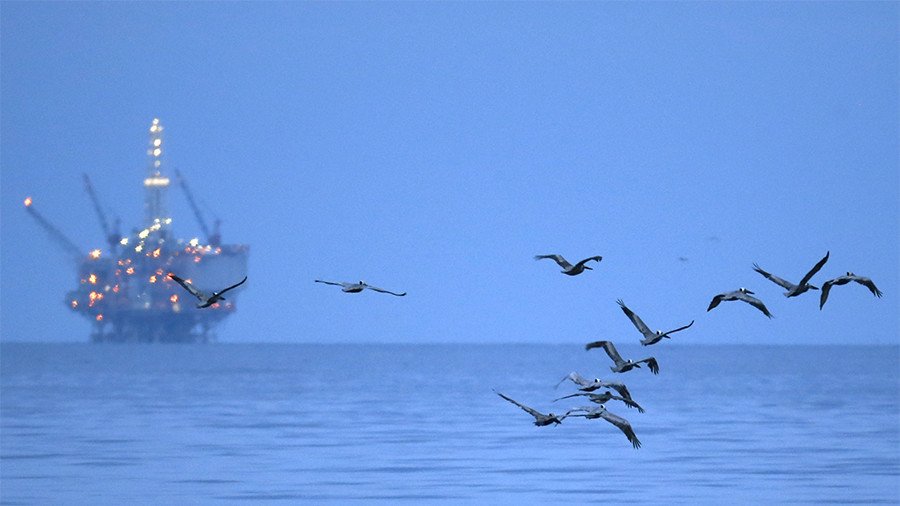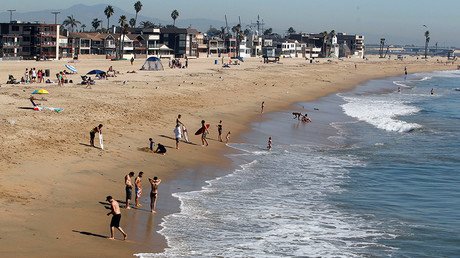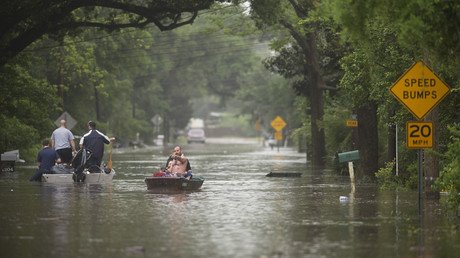Florida wins exemption from Trump’s offshore drilling plan

The Trump administration has given Florida a tourism exemption from the controversial plan to allow offshore drilling for oil and gas. The move is already provoking other states to seek similar exemptions.
After meeting with Florida Governor Rick Scott (R) on Tuesday, US Interior Secretary Ryan Zinke said he agrees with the governor’s position that “Florida is unique and its coasts are heavily reliant on tourism as an economic driver.”
US Interior Secretary Ryan Zinke and Florida Governor Rick Scott announce there will be no new offshore drilling in Florida. Both met in the Tallahassee International Airport, Tuesday. @TB_Times#offshoredrilling#floridapic.twitter.com/7lgjy6iCpD
— Scott Keeler (@SKeelerTimes) January 9, 2018
“As a result … I am removing Florida from consideration from any new oil and gas platforms,” Zinke announced on Twitter.
Read my full statement on taking #Florida off the table for offshore oil and gas. Local voice matters. pic.twitter.com/fJhv0p0CDC
— Secretary Ryan Zinke (@SecretaryZinke) January 9, 2018
Scott had criticized the Trump administration’s decision to support offshore oil and gas drilling on the outer continental shelf off the coasts of the US. Zinke said Trump had directed him to “take into consideration the local and state voice” in deciding policy.
The Trump administration last week proposed opening up nearly all US offshore water to oil and gas drilling – a move, it said, that would boost the economy and ensure US “energy dominance.” The five-year draft plan sparked protests from coastal states, environmentalists and the tourism industry and was described as a “shameful giveaway” to the oil industry.
Zinke said the department’s draft National Outer Continental Shelf Oil and Gas Leasing Program for 2019 to 2024 would make over 90 percent of the Outer Continental Shelf’s (OCS) total acreage available for leasing to drillers – a national record.
That would reverse the Obama administration order placing 94 percent of the OCS off-limits to drilling. Obama’s 2017-2022 plan would be replaced by the new program once it is finalized.
The administration’s Florida exemption decision removes from consideration a portion of the eastern Gulf of Mexico, but not all of it.
Florida state waters extend 3 nautical miles from the shore on the Atlantic, and 9 nautical miles on the Gulf side, according to the Florida Fish and Wildlife Conservation Commission.
Senator Bill Nelson (D-Florida) called it a “shameless political stunt,” and said the coastline could still be a target and he would file legislation for a permanent ban.
“Floridians should beware and they should make their objections known because if we don’t, then the administration will try to say they never heard objections,” Nelson said from the Senate floor on Wednesday.
Nelson wrote to Zinke raising numerous questions about what exactly was off the table, including seismic testing.
The reversal is likely to trigger further demands from other states. South Carolina’s Governor Henry McMaster, a Republican, has said he will also seek an exemption.
NEW: @henrymcmaster says he plans to ask Trump administration to exempt South Carolina from offshore drilling."We cannot afford to take a chance with the beauty, the majesty and the economic value and vitality of our wonderful coastline” #scpol
— Jamie Lovegrove (@jslovegrove) January 10, 2018
The governors of New York and Oregon and the attorneys general of Maryland and California - all Democrats - were among those who called on Zinke to ban offshore drilling.
Dear Secretary Zinke, California like Florida, has hundreds of miles of beautiful coastline and a governor who wants to keep it that way. Or is that not enough for blue states? https://t.co/vQ5Qtl8Xik
— Adam Schiff (@RepAdamSchiff) January 10, 2018
Oceana, an environmental lobby group, said it is pleased Zinke had removed Florida from areas open to drilling.
“Such a quick reversal begs the question: Will the Trump administration give equal consideration to all the other coastal governors from both parties who overwhelmingly reject this radical offshore drilling plan?” Oceana campaign director Diane Hoskins said in a statement, quoted by Reuters.
The effort to open previously off-limits acreage in the Atlantic, Arctic and Pacific oceans comes less than eight years after BP’s Deepwater Horizon oil spill in the Gulf of Mexico, the largest in American history. The disaster caused billions of dollars in economic damage and led the Obama administration to increase regulation of the industry.
The Defense Department has also raised concerns about drilling off the eastern Gulf of Mexico where military exercises are held, according to the BBC.















